
The European market potential for Gen Z tourism
Gen Z is becoming one of the most influential consumer groups in the world today. They have never known the world without technology. They work, play, shop and communicate online and demand seamless connectivity. They are open-minded and want to integrate sustainability into all aspects of their lives, including travel. There are plenty of opportunities for local operators to attract the European Gen Z market as it enters the workplace. Local operators have to pay attention to both sustainability and technology to attract them.
Contents of this page
1. Product description
Gen Z (Generation Z) is the youngest consumer group, born between 1997 and 2012, and aged between 12 and 27 as of 2024. They follow the Millennials (born between 1981 and 1996, aged between 28 and 43 today) and precede Generation Alpha, who are today’s children born from 2013 and are aged up to 11. Informally, they are referred to as ‘Zoomers’. As they age into adulthood at the age of 18, finish education and enter the workforce, their importance as a consumer group with spending power will increase.
Figure 1: Who is Gen Z?

Source: WP Engine, 2020
Gen Z is the first generation to be entirely shaped by technology and they are often referred to as ‘digital natives’. Growing up, their global outlook was shaped by extraordinary global events including climate change, globalisation, terrorism and global financial crises. Gen Z was also significantly affected by the Covid-19 pandemic.
Characteristics of Gen Z
In the face of the numerous factors that shape this group, Gen Z is open-minded and has a strong sense of responsibility towards the global community and the environment. They have several defining characteristics.
Figure 2: Characteristics of Gen Z
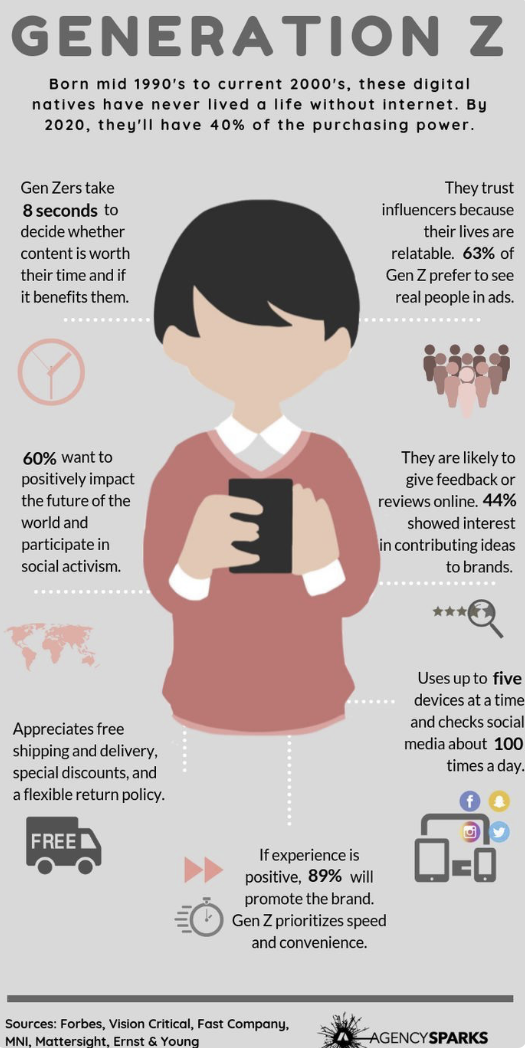
Source: Setup, 2020
- Gen Z are naturally tech-savvy. Technology is hardwired into their way of life. Their expectations for technology are limitless, and they adopt new technologies easily. They use multiple devices and spend more time connected than any other generation.
- Climate change is a major concern for Gen Z. Swedish climate activist Greta Thunberg is a well-known figure who has helped raise awareness of the issue and inspired millions of young people around the world to act. 60% of Gen Z want to have a positive impact on the world, compared to 39% of Millennials.
- Gender equality and diversity are important issues for Gen Z. Tolerance, inclusiveness, openness and freedom of expression are critical factors for this generation.
- Trust is another factor that Gen Z take seriously. They rely on influencers, smaller companies and brands, and word of mouth to provide them with the authenticity and truth they require.
- Gen Z has very high levels of anxiety, higher than any other generation. Gen Z worries about the state of the world, the state of their health and that of other people. They are concerned about long-term financial stability and security, finding a satisfying job and personal happiness.
- In the workplace, Gen Z are ambitious and keen to earn and save money. However, other things also matter to them. Being satisfied at work is as important as earning a good salary.
Gen Z has the travel bug
Gen Z is one of the keenest generations to travel. Like Gen Y before them, Gen Z prioritises travel experiences over things. After the pandemic, Gen Z had the greatest levels of pent-up demand for travel amongst the major consumer groups.
According to American Express, 79% of Gen Z and Millennials consider leisure travel a priority, and 84% would rather go on a dream holiday than buy a new, luxury item. 79% also said they want to immerse themselves into the lives of the local people in the places they visit and to have authentic experiences. Local food and specialities are important to this generation.
Figure 3: Gen Z travel characteristics
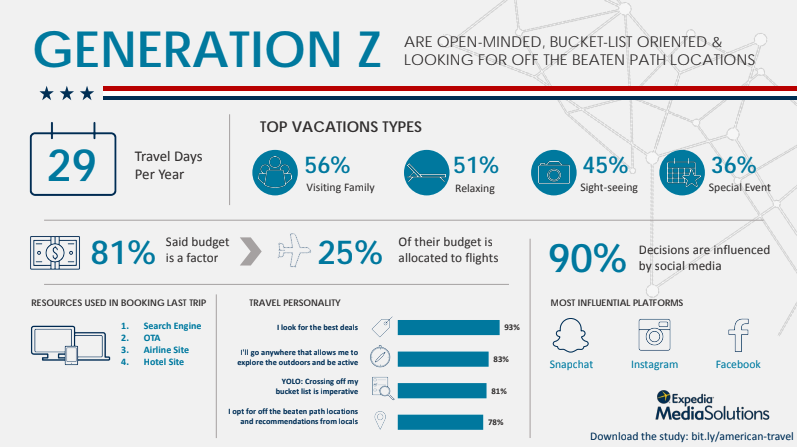
Source: Expedia, 2018
Gen Z look for adventure, cultural immersion and personal growth. They are also value-driven and budget conscious. Being tech savvy, they are good at finding good deals and discounts and are more likely to use local homestays, hostels and cheap Airbnb or other sharing platforms for budget accommodation options. Value for money is Gen Z’s top consideration when choosing a destination (47%), followed by cheap flights (45%) and safe and secure destinations (42%).
Table 1: What Gen Z look for when choosing a destination
| When choosing a destination, Gen Z looks for: | % |
| Value for money destination | 47% |
| Availability of cheap flights | 45% |
| Safe and secure destination | 42% |
| Availability of cheap accommodation | 32% |
| Opportunity to do specific activities (for example, outdoor, sports, cooking classes) | 20% |
| The destination offers a once-in-a-lifetime experience | 20% |
| Convenient flight schedule/duration | 18% |
| The destination respects equality and diversity | 14% |
| The destination is well-known for environmentally friendly practices | 10% |
Source: ETC, 2020
According to travel research by the European Travel Commission (ETC), Gen Z travel decisions are mostly influenced by friends and family (word of mouth) and travel review sites like Tripadvisor, both 49%. Tourism websites (36%), social media feeds (35%) and special discounts (29%) are also important sources of information for Gen Z.
When it comes to sustainable travel, almost four in ten (38%) of Gen Z would consider staying in an eco-friendly or green accommodation on their next holiday, compared to 33% of 25+. They are also more likely to search for sustainable travel offers (34%) and look for ways to offset the carbon footprint from their holidays (22%).
Figure 4: Gen Z sightseeing in Barcelona, Spain

Source: Karsten Winegeart, Unsplash, 2021
End market segmentation
Destinations should consider Gen Z an important consumer group to target. Although many are yet to enter the workforce, there are good reasons to keep this group in mind. Gen Z can be divided into 2 broad consumer groups:
- Teenagers at secondary school, age 12–18: This group have very little purchasing power but have some influence over their families’ travel decisions.
- School leavers, university students and young professionals aged 19–27: This is an influential group of young people who are just setting out on the road to independence and making their own travel decisions. A large cohort will take a ‘gap year’ to travel or work before going to university or starting in the workplace.
- One subsegment of school leavers, university students and young professionals are gap year students. Find out more about this group in the CBI study What are the opportunities in the European gap year tourism market.
Gen Z accounts for around 20%, or two-fifths, of the global population. As Baby Boomers continue to age, the group will decline, and the share of Gen Z, along with that of Gen X and Gen Y, will increase. The Alpha generation, born from 2011 onwards, is the world’s youngest generation and is still very small. This group will also see its share increase over the coming decades.
Source: LinkedIn, 2023
Examples of Gen Z experiences
The market for Gen Z travel is substantial. Many tour operators include themes for younger travellers in their travel plans, such as 18–30 or Gap Year Travel. The table below shows a small collection of standard trips for the European Gen Z market.
Table 2: Examples of trips and holidays aimed at the Gen Z market
| Theme | Description of Trip |
| Adventure and Homestay | Volcano Trail – Waves and Local Ways: Take the road less travelled through the Central American countries of Guatemala, Honduras, El Salvador, Nicaragua and Costa Rica. A 17-day adventure to volcanoes, beaches, sightseeing attractions and experiencing local culture with a 2-night community homestay. Travel is in local transport and stay in simple, affordable hotels. There are lots of optional activities like surfing lessons and a tour of local hot springs. |
| Adventure and Culture | 18-day adventure in South Korea: Temples, martial arts, pop culture, karaoke and Hallyu Culture. Additional activities include visits to local villages, enjoying the famous Korean cuisine, taking part in K-pop dance classes and spending a night in a temple to learn about the lives of traditional monks.
|
| Adventure and Living Like a Local | Local Living in Ecuador, in the Amazon Jungle: A homestay experience with a local family enjoying jungle walks and waterfalls, a visit to an animal rescue centre by canoe, and learning about local medicinal plants and how they are used. Stay in clean, local accommodation with lots of additional activities like cycling, hiking and rafting. |
| Volunteering with Children | Volunteer with Children in Nepal: Volunteer with disadvantaged children in care centres and focus on improving their early childhood development. Lots of free time to explore Nepal’s heritage sites, take part in adventure sports, practice yoga and more. |
| Volunteering and Conservation | Giraffe and Lion Conservation in Kenya: A volunteer placement to support wildlife conservation in Kenya, working with animals who live on the savannah plains. Volunteers work alongside conservation experts to help preserve biodiversity and stem population declines. Accommodation is in a ranch house and shared with other volunteers. |
| Volunteering and Learning | Sri Lanka Mental Health and Psychology Programmes: A valuable and insightful programme spent shadowing and observing mental health doctors to gain insight into the struggles suffered by mental health patients. Time is spent in hospitals, half-way homes and a local Ayurveda clinic. |
Source: Acorn Tourism Consulting, 2023
Accessible tourism on the European market
Accessible tourism is the ongoing endeavour to ensure that tourist destinations, products and services are accessible to everyone, regardless of physical limitations, disabilities or age. It encompasses publicly and privately owned tourist locations. These improvements not only benefit people with permanent physical disabilities, but also parents with small children, elderly travellers, people with temporary injuries (for example, broken legs) as well as their travel companions. Disabled tourists may travel individually, in groups, with their families or with caretakers.
Accessibility and Gen Z
Gen Z want to travel no matter their disability. As an inclusive generation, they expect to be treated the same as everyone else. Social media platforms like TikTok and Instagram have large communities of disabled influencers, like Simply Emma and Amy Pohl, who challenge the narratives that surround disabilities. This type of communication appeals to the socially aware and inclusive nature of Gen Z.
- Empathy and communication are key. Always be upfront with Gen Z about what you can and can’t provide. Use detailed and descriptive text and include videos and images for extra clarity.
- Do not charge Gen Z with disabilities more for trips or accommodation even if you have to provide extra services. Europe’s Gen Z expect people with disabilities to be treated the same as people without.
- Make sure all facilities are suitable for people with disabilities and without. Beach holidays are popular among young people – think carefully about how they can use these facilities without relying on other people for help.
- Be honest. For instance, if you know that it will take several hours to reach a destination and there are few places with suitable facilities to stop on the way, you should say so. Young travellers with disabilities will be very clear about what they can and cannot do.
- Make sure the ground suppliers you use keep their facilities well maintained, like walkways, ramps and mobile lifts.
- Read this article: 10 people on what accessible travel means to them. It is full of tips for travel providers to help them support guests with disabilities.
Tips:
- Read the CBI studies The European market potential for accessible tourism and Entering the European market What makes Europe an interesting market for Gen Z tourism?
- Europe is an interesting market to target for the size of its Gen Z population. The world’s population is youthful; people aged under 20 make up the greatest share of the world’s population. According to the World Youth, Student and Educational Travel Confederation (WYSE) the youth travel market (aged 15–29) accounts for 23% of all international tourism arrivals.
- However, the share of Gen Z varies across the world, with Europe having the lowest share in 2018. Nonetheless, the higher numbers of Gen Z in other regions do not necessarily mean that all members of this generation are able to travel easily. Financial independence is a clear factor that limits young people and their ability to travel independently.
- Figure 6. Share of the population of Gen Z by world region, 2018for accessible tourism for practical and useful advice for making your tours accessible.
2. What makes Europe an interesting market for Gen Z tourism?
Europe is an interesting market to target for the size of its Gen Z population. The world’s population is youthful; people aged under 20 make up the greatest share of the world’s population. According to the World Youth, Student and Educational Travel Confederation (WYSE) the youth travel market (aged 15–29) accounts for 23% of all international tourism arrivals.
However, the share of Gen Z varies across the world, with Europe having the lowest share in 2018. Nonetheless, the higher numbers of Gen Z in other regions do not necessarily mean that all members of this generation are able to travel easily. Financial independence is a clear factor that limits young people and their ability to travel independently.
Figure 6: Share of the population of Gen Z by world region, 2018
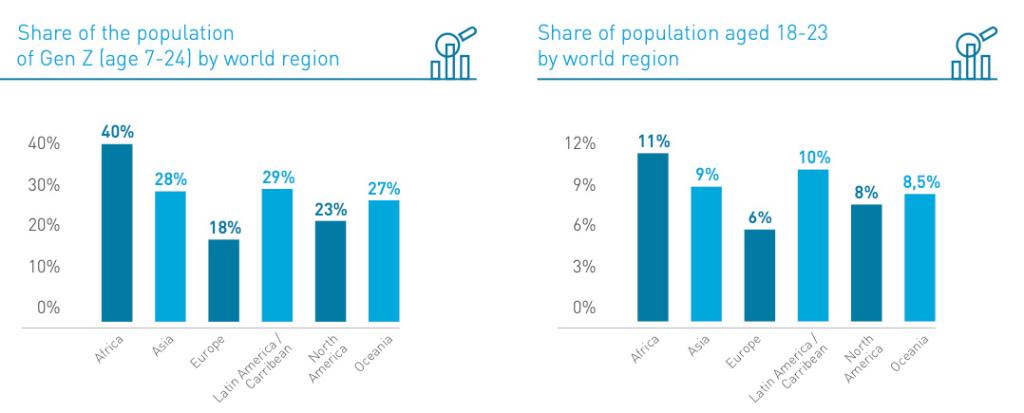
Source: Ibid United Nations DESA, 2020
European Gen Z generally have higher disposable incomes to spend on travel then Gen Z from developing countries. As a wealthier region than Africa, Asia and Latin America, Europe should be viewed as a market with a lot of potential.
In the coming years, Gen Z will become a particularly important market for the tourism sector. As they leave full time education and enter the workforce, their disposable income will increase. As they are already very enthusiastic travellers, Gen Z are likely to prioritise spending on travel and experiences, rather than things. As the economic climate is currently volatile, many will put off buying a house or car, determined to enjoy life and see the world before settling down.
Tip:
- For more information about gap year tourism consult the CBI study What are the opportunities in the European Gap Year Tourism Market?
Figure 7: Beach and leisure activities are popular amongst European Gen Z

Source: Louis Hansel, Unsplash, 2018
3. Which European countries offer the most opportunities for Gen Z tourism?
The European countries that offer the most opportunities for Gen Z in developing destinations are France, Germany, United Kingdom (UK), Italy, Spain and Poland. They had the largest Gen Z populations in Europe in 2022, at which point Gen Z were aged 10–25.
Source: Eurostat (EU Countries) 2023; ONS (UK) 2022
European Gen Z are keen to spend money on travel. Research into what they want from travel shows that Gen Z adults (aged 18+) plan to spend more on travel than any other group (26%). British Gen Z have the highest level of intent to spend more on travel products and services (44%), followed by Spain and Italy (34% each).
Figure 9: Gen Z’s intent to spend on travel in the next 12 months (2022)
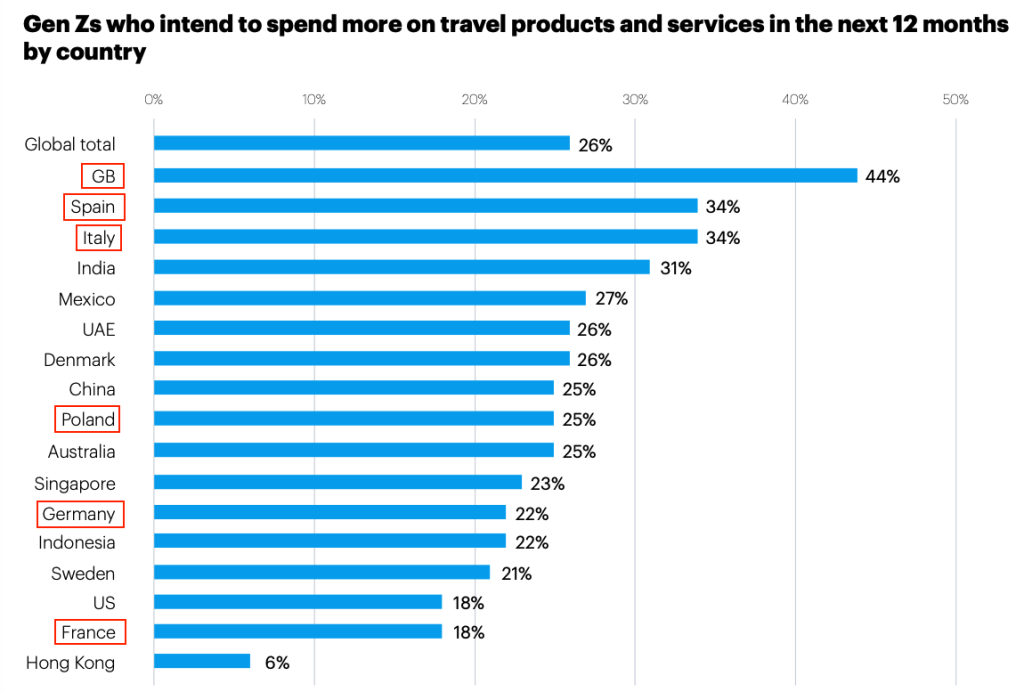
Source: Youth of today, travel of tomorrow, YouGov, 2022
Gen Z will grow in importance over the coming years. They are still a young cohort and do not have much to spend on travel yet. Travel is already a significant priority for them, and it will continue to be so. As their earning power increases, so will their travel preferences develop. It will be important to stay informed about Gen Z and their travel motivations now and in the future.
Profiles of each country and their Gen Z populations are provided below. Population statistics quoted are usually a year or 2 behind. Accordingly, note that Gen Z in 2024 are aged 12–27, but they were aged between 10 and 25 in 2022.
France
France has the largest population of Gen Z in Europe. In 2023, there were 12.4 million Gen Z aged between 10 and 25, representing 18% of the total population. French Gen Z are highly connected. Their most-used platforms are reported to be Snapchat (82%), Instagram (69%), Facebook and TikTok (both 40%). TikTok is gaining popularity faster among this group than the other platforms. These are the most important platforms for marketers targeting French Gen Z. ‘Gap years’ are referred to as ‘sabbatical years’ in France, and they refer to extended periods of travel.
Table 3: Travel Characteristics of French Gen Z, aged 18–24, 2023
| Most important factors when planning an international trip | Cost and affordability: 40% Experiencing local culture and history: 30% Incorporating excursions, tours and activities: 20% Child-friendly: 20% |
| Top activities while travelling | Beach and leisure activities: 40% Cultural and gastronomic activities: 40% Festivals, clubbing, nightlife: 40% Shopping: 30% |
| Regions in developing world they intend to travel to in next 12 months | Rest of Africa: 7% Central and South America: 4% North Africa: 3% Middle East: 3% Southeast Asia: 3% East Asia: 2% |
| Leading sources of information when learning about new destinations | Travel blogs: 32% Instagram: 32% Tripadvisor: 28% Websites of travel companies: 24% |
| Who they travel with most often | Friends: 45% Family: 37% |
| Preferred accommodation when travelling for leisure | 4 and 5 star accommodation: 45% 3 and 4 star accommodation: 27% Budget friendly accommodation: 9% |
Source: TGM Global Travel Survey 2023
Germany
There were 12.3 million German Gen Z in 2023, the second largest population in Europe. This group accounts for about 14.7% of the total population. German Gen Z are highly connected. In 2022, Instagram was the most popular platform for purchasing products (50%), followed by TikTok (47%). YouTube accounted for 37% of users, and Facebook was the least popular at 19%.
German Gen Z have strong connections with their family and friends, and it is the leading interest for the group (65%), followed by relaxing at home (48%). Travel is the third preferred hobby for the generation (33%), which is equally as important as keeping fit and doing sports (33%). They are also sustainably-minded, with 45% recycling household waste either always or very often, 43% taking public transport or cycling instead of using a car, and 35% purchasing locally made or grown products.
Research of global Gen Z in 2022 found that German Gen Z expressed the highest interest in international travel in the next 12 months (50%) compared to domestic travel (36%).
Table 4: Travel Characteristics of German Gen Z, aged 18–24, 2023
| Most important factors when planning an international trip | Cost and affordability: 40% Free time to relax: 33% Flexible schedule: 27% Breakfast included with hotel: 27% Excellent dining options: 27% Incorporating excursions, tours and activities: 20% |
| Top activities while travelling | Nature and adventure activities (for example, kayaking, hiking): 40% Cultural and gastronomic activities: 33% Beach and leisure activities: 33% Photography: 33% Festivals, clubbing, nightlife: 27% Sporting activities (for example, surfing, cycling): 27% |
| Leading sources of information when learning about new destinations | Travel company websites: 50% Tripadvisor: 29% Travel blogs: 25% YouTube: 25% Instagram: 21% TikTok: 21% |
| Who they travel with most often | Family: 50% Friends: 24% Solo: 14% |
| Preferred accommodation when travelling for leisure | Budget friendly: 36% 3 and 4 star: 33% 4 and 5 star: 21% |
Source: TGM Global Travel Survey 2023
German Gen Z has a strong sense of responsibility when they travel. While they are aware that travelling is important for their personal development (50%), they are equally aware that tourism benefits the local society (50%). However, they are also aware that too many tourists can cause damage to local communities (49%) and believe that flights should be taxed or reduced to lessen the impact on the environment (41%).
The United Kingdom (UK)
The UK has a large number of Gen Z, estimated at 12 million in 2022. This represents around 18% of the total population.
British Gen Z are the most ethnically diverse age category of the British population. They support progressive ideas and activism related to diversity and equality. They are concerned about job insecurity and a lack of career opportunities. Mental health is another issue that concerns them. British Gen Z are tech-driven, spending half their time connected online.
Figure 10: Top issues concerning British Gen Z, 2022
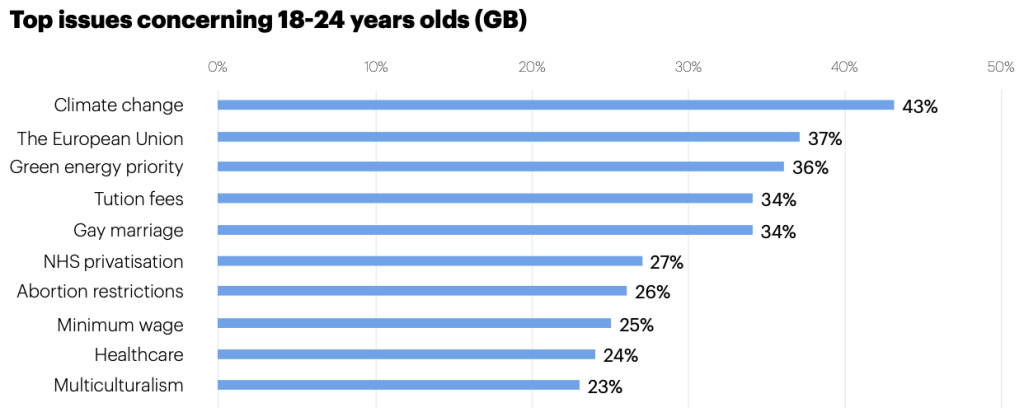
Source: Youth of today, travel of tomorrow, YouGov, 2022
Friends and family are very important to British Gen Z (59%), which is likely a reflection of the comfort and security home represents to an anxious generation. Travel is the fourth preferred interest for Gen Z in the UK (44%), after relaxing at home (56%) and shopping (45%). British Gen Z is very sustainably minded, with 66% recycling household waste either very often or always. 51% use public transport or cycling instead of using a car, and 46% are reducing their use of plastics.
British Gen Z are heavy users of the social media. In a 2022 survey, around 7 out of 10 respondents stated they used TikTok and YouTube every day. Instagram was the top social media platform used by Gen Z (71%), closely followed by TikTok (69%), YouTube (68%) and Snapchat (67%).
Table 5: Travel Characteristics of English Gen Z, aged 18–24, 2023
| Most important factors when planning an international trip | Cost and affordability: 62% Experiencing local culture and history: 31% Centrally located accommodation: 23% All-inclusive experiences: 15% Incorporating excursions, tours and activities: 15% Breakfast included with hotel: 15% Nightlife and entertainment: 15% |
| Top activities while travelling | Beach and leisure activities: 62% Cultural and gastronomic activities: 38% Shopping: 38% Photography: 31% Sporting activities (for example, surfing, cycling): 31% Nature activities (for example, kayaking, hiking): 23% |
| Leading sources of information when learning about new destinations | TikTok: 50% Travel company websites: 27% Travel blogs: 23% Instagram: 23% Tripadvisor: 19% YouTube: 19% |
| Who they travel with most often | Family: 69% Friends: 23% |
| Preferred accommodation when travelling for leisure | 4 and 5 star: 42% Budget friendly: 33% 3 and 4 star: 17% |
Source: TGM Global Travel Survey 2023
British Gen Z are highly aware of travelling responsibly. 73% care about the wellbeing of the local people, and 71% understand that tourism benefits local society. 67% believe that travelling is important for their personal development, and 61% understand that too many tourists causes damage to local communities.
Italy
In 2023, there were 8.6 million Gen Z in Italy, representing 14.6% of the population. Deloitte published some interesting insights into Italian Gen Z.
- Cost of living is the biggest concern for Italian Gen Z (38%), followed by climate change (34%) and unemployment (29%).
- They are more concerned about climate change compared to Gen Z globally, but less likely to purchase environmentally sustainable products than the global norm.
- Friends and family (68%) followed by work are the most important factors to their sense of identity for Italian Gen Z.
9 out of 10 Italian Gen Z and Millennials consider themselves to be foodies. They are more likely to buy natural and organic food compared to their peers in Western Europe and are keen to try new things. They post more social media content relating to food than other countries in the region.
YouTube is Italian Gen Z’s favourite social media channel (74%) followed by Instagram (61%) and TikTok (58%).
Table 6: Travel Characteristics of Italian Gen Z, aged 18–24, 2023
| Most important factors when planning an international trip | Cost and affordability: 36% Centrally located accommodation: 36% All-inclusive experiences: 21% Excellent dining options: 21% Experiencing local culture and history: 21% Incorporating excursions, tours and activities: 21% Flexible schedule: 21% Nightlife and entertainment: 21% |
| Top activities while travelling | Beach and leisure activities: 56% Shopping: 50% Cultural and gastronomic activities: 43% |
| Leading sources of information when learning about new destinations | Instagram: 53% Websites of travel companies: 36% YouTube: 25% Tripadvisor: 22% Travel blogs: 20% TikTok: 14% |
| Who they travel with most often | Family: 50% Friends: 24% |
| Preferred accommodation when travelling for leisure | Budget friendly: 50% 3 and 4 star: 21% Villa/home: 15% 4 and 5 star: 14% |
Source: TGM Global Travel Survey 2023
Spain
Spanish Gen Z numbered 7.6 million in 2023, representing 16% of the total population. This population cares about a wide range of different causes. They are more politically-minded than their peers. Almost 3 out of 5 Spanish Gen Z have taken part in a protest. The top 3 causes important to them are animal rights, poverty/homelessness/hunger, and climate change/environmental efforts. They also care passionately about LGBTQ+ rights and gender equality.
WhatsApp is the most popular social media platform used by Spanish Gen Z (93%), followed by Instagram (91%), YouTube (81%) and TikTok (60%).
Table 7: Travel Characteristics of Spanish Gen Z, aged 18–24, 2023
| Most important factors when planning an international trip | Cost and affordability: 50% Experiencing local culture and history: 33% Excellent dining options: 25% Free time to relax: 25% Nightlife and entertainment: 25% |
| Top activities while travelling | Beach and leisure activities: 75% Photography: 50% Shopping: 42% Cultural and gastronomic activities: 25% Nature and adventure activities (for example, kayaking and hiking): 25% |
| Leading sources of information when learning about new destinations | Instagram: 36% Tripadvisor: 32% Travel blogs: 29% Websites of travel companies: 29% TikTok: 29% |
| Who they travel with most often | Family: 50% Friends: 25% Couple (with partner): 17% |
| Preferred accommodation when travelling for leisure | Budget friendly: 75% 3 and 4 star: 17% |
Source: TGM Global Travel Survey 2023
Poland
In Poland, there were 5.6 million Gen Z in 2023, the largest population of all Eastern European countries. This accounts for 15.2% of the total population. Polish Gen Z are the first Polish generation to be raised in a free country after the fall of the Berlin Wall. However, Gen Z is estimated to be 50% smaller than the Millennial/Gen Y generation that came before them.
Polish Gen Z are less interested in having a career; ‘work is just work’. They are more interested in other values, like happiness (62%), family (60%), pursuing their passions (56%), ecology (51%) and independence (51%). Professional development and financial security are important to only 11% and 16%, respectively. However, they are enthusiastic about the opportunities that technology might bring to their careers.
Polish Gen Z are also highly connected. Facebook is the most popular platform (77%), closely followed by Instagram (72%) and YouTube (70%). TikTok follows with 44%.
Table 8: Travel Characteristics of Polish Gen Z, aged 18–24, 2023
| Most important factors when planning an international trip | Free time to relax: 40% Cost and affordability: 32% Pet friendly: 23% Excellent dining options: 20% Nightlife and entertainment: 20% |
| Top activities while travelling | Beach and leisure activities: 58% Cultural and gastronomic activities: 41% Festivals, clubbing, nightlife: 38% Photography: 32% Shopping: 27% Nature and adventure activities (for example, kayaking, hiking): 26% |
| Leading sources of information when learning about new destinations | TikTok: 46% YouTube: 33% Websites of travel companies: 25% Instagram: 23% Facebook: 22% |
| Who they travel with most often | Friends: 29% Solo: 25% Couple (with partner): 23% Family: 22% |
| Preferred accommodation when travelling for leisure | 2 and 3 star: 56% 4 and 5 star: 20% Budget friendly: 15% |
Source: TGM Global Travel Survey 2023
Tips:
- Build a website or improve your website. You need to have an online presence or you will not reach Gen Z at all. Read the CBI study How to be a successful tourism business online for a range of tips to help you.
- Use social media marketing. To reach the Gen Z market, it is essential that you have a presence on Instagram and TikTok. Consult online guides like How to make sure you’re marketing to Gen Z the right way and Creating TikToks that convert Gen Z audiences.
- Use travel influencers to reach the Gen Z market. You must be careful who you choose, as the message they promote must be authentic to attract Gen Z. Read the CBI report How to work with Influencers to find out more.
- Consider ways of making your business more openly sustainable to appeal to Gen Z. Think about using public transport or bicycles to operate your tour. Ban single use plastics like straws and plastic cutlery.
- Feature testimonials and reviews from past customers widely on your website. Make sure you ask your customers to leave reviews directly on your website, Tripadvisor or Google.
4. Which trends offer opportunities or pose threats in the European Gen Z tourism market?
Gen Z is one of the most exciting consumer groups that has a major influence on travel trends. Sustainability is a key trend that is becoming ever more important to Gen Z. New technologies are being driven by Gen Z’s expectations of seamless connectivity. Pop-culture provides local operators an interesting way to appeal to this young market.
Gen Z demand responsible and eco-friendly travel practices
Gen Z is one of the most concerned consumer groups about climate change. They have grown up understanding the importance of sustainability in all areas of life, including travel. Gen Z has the potential to represent responsible and sustainable travel behaviours. As sustainability issues continue to evolve, the market represents an opportunity to influence positive change.
Some of the changes to their travel behaviour include:
- Travelling by train or car instead of flying.
- Shopping locally so that more money remains in the destinations with local communities.
- Researching to make sure the operators they travel with and the destinations they travel to have sustainable actions in place.
- Volunteering on local projects led by the local communities that make a real difference to local people’s lives.
Many trips aimed at the European Gen Z are marketed as being sustainable. These sustainable activities support local communities and minimise the impact tourism has on the destination, and participants get involved in hands-on ‘green’ activities. Trips that include sustainable actions that Gen Z can get involved in is essential to attract this market.
Tips:
- Be clear on your website about the sustainable actions you do as a business. Make sure you feature sustainability information prominently. If you make sustainability part of your USP (unique selling point), you will spark their interest straight away.
- Do not make claims that are not true. This is known as ‘greenwashing’. You will be found out, and it will harm your reputation.
- Download the 3 CBI studies to help your business become sustainable, go green and ensure social responsibility. You can find them here: How to be a sustainable tourism business, Tips to Go Green and Tips to become socially responsible.
Technological development drives Gen Z’s expectation of seamless connectivity at all times
Technology continues to develop at a fast pace, and Gen Z has low tolerance for technological problems. To appeal to Gen Z, tour operators and tourism service providers need to keep pace with their expectations.
Gen Z regularly use the internet and social media as their primary sources of information. Platforms like Instagram, TikTok and YouTube are constantly evolving to meet this market’s needs. AI (artificial intelligence) will be increasingly integrated into social media to make users’ experiences more personalised. It is possible that users will be able to do everything through social media, like all-in-one apps.
Mobile-friendly technology is essential for Gen Z. They increasingly prefer to book online using mobile devices, often while travelling. Instant booking and confirmation are important to Gen Z. Developments by the big brands like Instagram focus on mobile technology. Today, you cannot message on Instagram through a laptop or desktop: it is fully mobile-based.
As technology continues to evolve, it becomes even more important to take privacy and the protection of customer data very seriously. To do business with the European market you will need to comply with the GDPR to ensure you keep all your customers’ data safe.
Tips:
- Keep up to date with technological developments as best you can. Bookmark reputable tech news websites like TechCrunch, Wired and The Verge. Network with your peers and experts to share and build knowledge.
- Make sure your tours can be booked on a mobile device. If your website cannot take bookings yet, consider updating it. Read the CBI study How to be successful online for help.
- Experiment with new social media platforms and features. the internet is a good source of support if you need tips about specific issues.
- Read the CBI business guide, What are the requirements for tourism services in the European market for more information about GDPR.
Gen Z at the forefront of pop-culture tourism
Pop-culture tourism is a trend that has been growing amongst young people for several years. It involves travelling to places made famous by TV and movies. Gen Z are heavily influenced by things they see on screen. They love to travel to places connected with their favourite shows for an immersive experience. Pop-culture tourism is also known as ‘fandom tourism’ or ‘set-jetting’. Fans love pop-culture as it creates a sense of community between people who share similar interests, and experiences are widely shared on social media.
Pop-culture is not just TV and film, it includes music and musicians, art and artists, museums, digital games like Pokémon and even books. Popular destinations associated with the niche include Croatia and Ireland (Game of Thrones), New Zealand (Lord of the Rings), Seoul in South Korea (Squid Game and K-pop), Jordan, (Indiana Jones) and Vietnam (King Kong – Skull Island).
See this example of a pop-culture tour offered by a local tour operator, Jordan through the Movies.
Tips:
- Find out what pop-culture locations exist in your destination. See if you can create a tour or experience around the location that would appeal to Gen Z.
- Collaborate with a suitable influencer to promote your experience. To find out more about working with influencers, read the CBI study How to work with influencers.
Figure 11: Active Gen Z – Trekking in Colombia
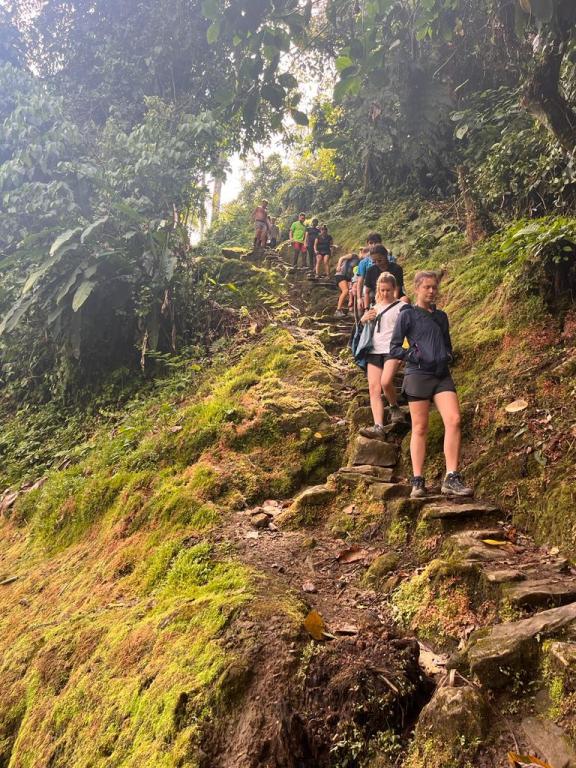
Source: Acorn Tourism Consulting, 2023
Gen Z embrace digital nomadism
Since flexible working and remote working have become more commonplace, Gen Z are a key market of digital nomads. Being a digital nomad involves staying in a destination away from home for a longer period of time and working remotely. Gen Z choose where to stay carefully as connectivity is critical to being able to work remotely.
For destinations, encouraging digital nomads can help to address seasonality and stimulate tourism out of season. It also offers opportunities for lesser known destinations to promote a slower, more peaceful pace of life to digital nomads.
However, the rise in popularity of digital nomadism has had some reported negative effects. The rising cost of living in certain destinations like Spain and Mexico are due in part to the increasing numbers of long-stay wealthy tourists. This can lead to resentment among local people who may be forced out of their accommodation to make way for tourists with foreign income.
Tips:
- Pay attention to broadband speeds and connectivity in your destination. To appeal to digital nomads, connectivity must be reliable and fast. If internet speeds are insufficient, find out from your tourist board or broadband providers what plans are in place to improve services.
- Clearly promote the services you offer for long-stay remote working. Make sure furniture and workspaces are suitable for working. If you can offer ergonomic furniture that has been specially designed for working, this will be appealing to Gen Z.
- Take a look at what visas are required for long term stays in your country. If they are not available yet and long stays are impossible without a visa, lobby your tourist board to call for changes.
Acorn Tourism Consulting Limited carried out this study on behalf of CBI.
Please review our market information disclaimer.
Search
Enter search terms to find market research
